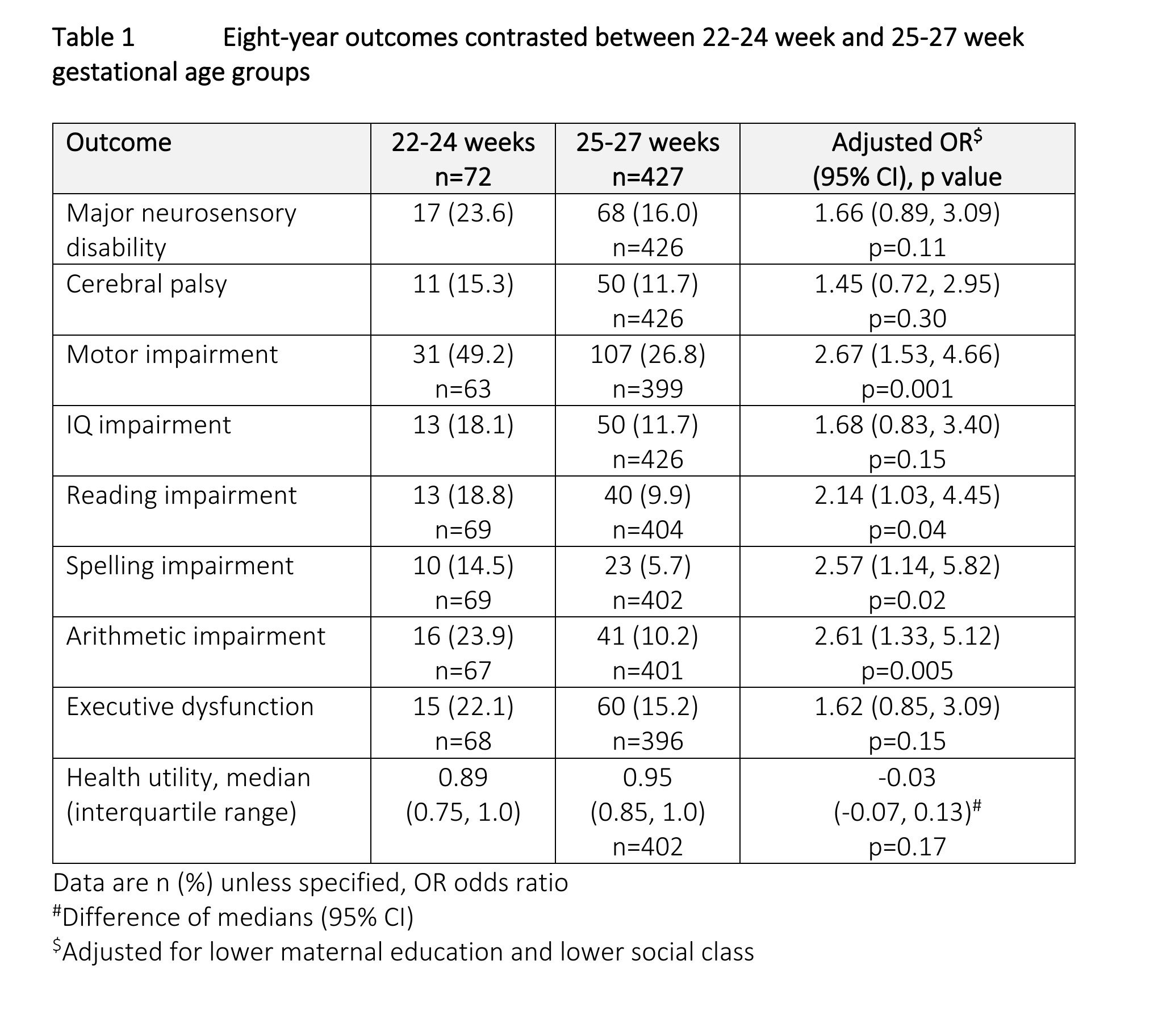Neonatal Follow-up
NICU Follow Up and Neurodevelopment 4: Very Long and Long Term Follow-Up
141 - Neurosensory, cognitive and academic outcomes at 8 years in children born extremely preterm: 22-24 weeks compared with 25-27 weeks.
Sunday, April 30, 2023
3:30 PM - 6:00 PM ET
Poster Number: 141
Publication Number: 141.362
Publication Number: 141.362
India Marks, Murdoch Children’s Research Institute, Windsor, Victoria, Australia; Lex W. Doyle, University of Melbourne, Parkville, Victoria, Australia; Peter J. Anderson, Monash University, Cheltenham, Melbourne, Victoria, Australia; Alicia Spittle, University of Melbourne, Parkville, Victoria, Australia; Jeanie Ling. Cheong, Murdoch Children's Research Institute, Parkville, Victoria, Australia
- JC
Jeanie Cheong, MBBS, MD
Principal Research Fellow
Murdoch Children's Research Institute
Melbourne, Victoria, Australia
Presenting Author(s)
Background: Infants born extremely preterm (EP, < 28 weeks’ gestation) are at high risk of health and developmental problems. There has been a move towards lowering the gestational age for provision of intensive care. Rates of neurodevelopmental disability are generally known to be higher amongst infants born at earlier gestations; however, knowledge of school-age outcomes for those born < 25 weeks is sparse.
Objective: To compare neurosensory, cognitive and academic outcomes among school-aged children born EP at 22-24 weeks’ gestation with those born EP at 25-27 weeks’ gestation, across three birth-year epochs.
Design/Methods: Population-based cohorts of all survivors born EP in the state of Victoria, Australia, in 1991-92, 1997 and 2005 were recruited at birth. At 8 years of age, general intelligence (IQ), academic achievement, neurosensory status, motor impairment, executive function, and health utility were assessed. Major neurosensory disability comprised any of moderate/severe cerebral palsy, IQ < -2 SD relative to term controls, blindness, or deafness. Motor impairment was defined as a score < 5th centile on the Movement-ABC. Cognitive and academic impairments were defined as z-scores < -2 SD relative to controls born at term. Executive dysfunction was defined as a T-score ≥65 on the Behavior Rating Inventory of Executive Function (BRIEF). Outcomes were compared between children born 22-24 weeks (EP22-24) and those born 25-27 weeks (EP25-27), adjusted for social variables.
Results: 76/143 (53%) EP22-24 and 468/601 (78%) EP25-27 survived to 8 years. In general, the EP22-24 group had higher rates of disability and impairment, and lower health utility values (Table 1), with the strongest evidence for increases in motor and academic impairments compared with the EP25-27 group. Of note, 75% of the EP22-24 group were free of major neurosensory disability at 8 years.
Conclusion(s): Infants born at 22-24 weeks’ gestation are less likely to survive to 8 years of age, and experience higher rates of disability and impairment at school age, compared with children born at 25-27 weeks’ gestation. Despite this, more than half of liveborn babies at 22-24 weeks’ gestation survive to 8 years of age, and the majority of survivors are free of major neurosensory disability at this age. These data provide support for provision of intensive care to infants born < 25 weeks’ gestation.

